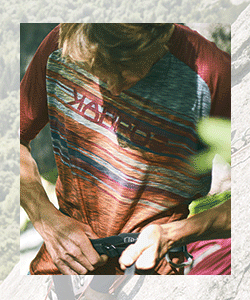Short climbers : the shorter you are, the stronger you will have to be

Let’s face it. For short climbers, strength counts more. Especially if you haven’t got a positive ape index. Unless you have the opportunity to constantly travel to different places to find routes or boulder problems that suit your height, you will have to train harder than taller people.
The beauty of climbing is that we all do it differently. It is in the differences that we come to express ourselves, our uniqueness, and come to know where our limitations lie. Sometimes it sucks to be short. But life is all about solving problems and overcoming challenges. Short climbers generally have to lock off farther, move dynamically more often, use smaller and intermediate holds. And train a lot !

Shorter people sometimes have the upper hand in climbing. Sometimes. But in general the taller you are the less strong and fit you need to be. There is relatively significant supporting evidence that suggests there is a difference in performance required for differing heights, with the taller climbers showing significant advantages in every single area except for core strength.
Short climbers : How to Compensate for Your Height ?
The main areas short climbers need to train to compensate for the height are below. These are the areas we think short climbers should focus on. Our goal here is not to lay out a program. But simply to give an overview on each of them. Since I started to seriously train a few years ago, I keep focusing on:
- lock-off strength
- dynamic movement and contact strength
- wide pulling strength
- finger strength
- core
Lock-Off Strength
In order to reach those big moves, short climbers have to be able to lock-off farther than taller people. Being able to pull a hold down as low as possible, and stay there for a while, is important for us, and needs to be trained. Lock-off strength can be worked on the campus board or by doing weighted pull-ups, for example.

However, campusing is unnecessary if you are new to training, if you are just starting out climbing, or if it hurts you to do it. Try using the campus board with feet on at first if you want to start slowly.
Climbing on hard-for-you routes and boulders will also help with lock-off strength. Strength-building on the wall should not be underestimated, so make sure you are challenging yourself on reachy and hard moves regularly.
Short climbers : use dynamic movement
Shorter people need to reach dynamically or jump to holds more often than taller people do, which isn’t surprising. A good way for me to train that is repeatedly trying hard, long moves on boulders and routes. When I get the move, I like to do it again so I get to know and feel my body better each time.

The most important thing I had to change about these moves is my mindset. I used to avoid long moves, and now I face them head-on. I try to figure out subtle body position changes to help me accurately grab holds that are far away. In fact I find that the Moonboard (or any board) is great to train dynamic movements.
Again, campusing is another good way to train dynamic movement. I definitely feel a difference in my climbing when I regularly work on it. I get more powerful, more confident, and my contact strength improves.
Wide Strength
For short climbers, wide strength is important because we are working at our maximum reach more often than taller people. You have to keep in mind that people are naturally much stronger when their elbows are bent. Therefore, training with our arms wide open is really helpful.
It will enable you to engage your shoulders and move off of a hold even when you are extended to a point that your face is touching the wall. Gymnastics rings help to train this (doing flys on them is really helpful for wide strength). But you can also do wide weighted pull-ups and many other exercises.











I am surprised you don’t mention flexibility. To be able to reach far away foot holds can be either achieved by long legs or with good flexibility, for example…
I agree with Thibault. Flexibility can be a huge advantage for any climbers regardless of their heights. I believe that being flexible and have a wide range of motion help so much in climbing. In my opinion, flexibility is more important than lock-off strengths.
This is quite the article, written to give short climbers some excuse. What makes you a good climb is your ability to do the same climb in your way. Shorter climbers don’t have to be stronger than taller climbers. Look at most of the professional climbers, they are not tall. It takes less strength to do most movements due to things like leverage. The longer your limbs are the more strength it takes for them to move through the same range of motion. Taller climbers weigh more, thus needing more strength. The only notable advantage tall climbers have is reach, which only helps with climbing certain types of climbs. And I would agree with the above comments that flexibility plays a greater role than lockoff strength. There a lot of good climbers that can’t do lockoffs or even 10 pullups
Flexible movement can help you attain your full potential. Yoga or similar practises may help. Improve your climbing abilities by strengthening your balance and core stability.